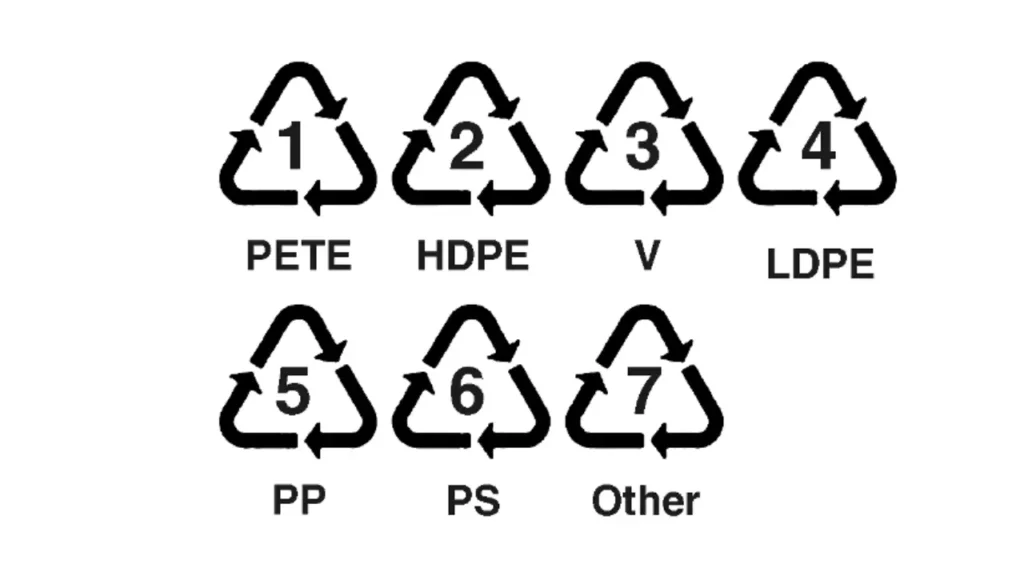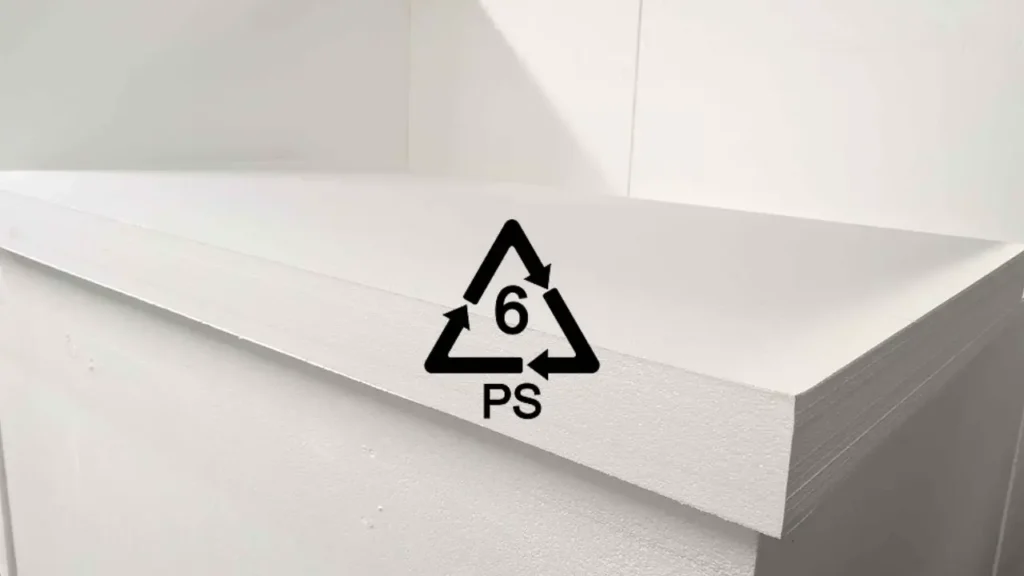Ever picked up a plastic item and wondered what the little number inside the triangle means? These seemingly simple symbols, known as Resin Identification Codes (RICs), hold the key to understanding the type of plastic you’re holding and, more importantly, its potential for recycling.
While often confused with a universal recycling symbol, RICs were primarily designed to help manufacturers and recyclers sort plastics efficiently. This guide will demystify these codes, empowering you to make more informed decisions about your plastic consumption and contribution to a more sustainable future.
What is the Resin Identification Code?
The Resin Identification Code (RIC) is a system of symbols found on plastic products that identifies the specific type of plastic resin used to manufacture the item.
Developed in 1988 by the Society of the Plastics Industry (now the Plastics Industry Association) and now administered by ASTM International, the RIC consists of a number (1 through 7) enclosed in a triangle, often accompanied by an abbreviation for the plastic type (e.g., PET, HDPE).
While often mistakenly thought to indicate recyclability, the primary purpose of the RIC is to help manufacturers and recyclers sort and identify different plastic materials for consistent manufacturing and reprocessing, though it can also aid consumers in understanding what plastics might be accepted by local recycling programs.

The Resin Identification Code (RIC) system was developed to help identify the type of plastic resin used in manufactured articles. This standardization aids in the sorting and reprocessing of plastics, which is crucial for recycling efforts and for manufacturers to ensure consistency in their materials. While the symbols often resemble recycling arrows, their primary function is to identify the plastic’s composition, not necessarily its recyclability in all local programs.
Understanding these codes is essential for consumers who wish to make more informed decisions about plastic products and their disposal. For businesses, knowing the RICs is vital for proper material handling, quality control, and adherence to environmental guidelines.
Resin Identification Code 1 (PETE or PET)
Polyethylene Terephthalate, commonly known as PET or PETE, is a lightweight, strong, and transparent plastic. It is widely used for beverage bottles (water, soda), food jars (peanut butter, salad dressing), and some common packaging due to its excellent barrier properties against gas and moisture, which helps preserve freshness.
PET is one of the most frequently recycled plastics globally. It can be recycled into new bottles, polyester fibers for clothing, carpets, and even strapping. Most curbside recycling programs readily accept PET containers, making it a cornerstone of plastic recycling initiatives.
Resin Identification Code 2 (HDPE or PE-HD)
High-Density Polyethylene, or HDPE, is a robust, opaque plastic known for its durability and resistance to chemicals. It’s commonly found in milk jugs, detergent bottles, shampoo bottles, and some grocery bags. Its strength makes it suitable for containers that need to withstand impact and hold various liquids.
HDPE is also widely accepted in recycling programs and is considered a safe and stable plastic. Recycled HDPE can be transformed into plastic lumber, picnic tables, playground equipment, and new non-food bottles, contributing significantly to circular economy efforts.
Resin Identification Code 3 (V or PVC)
Polyvinyl Chloride, or PVC, is a versatile plastic that can be rigid or flexible. It’s used in a wide array of products, including pipes, window frames, siding, flooring, and some non-food bottles. Its durability and resistance to weathering make it suitable for long-lasting applications.
PVC recycling is less common in curbside programs due to potential complexities in processing and concerns about additives. While some specialized recycling facilities exist for PVC, it’s generally not as widely recycled as PET or HDPE, and consumers should check with their local recycling guidelines.
Resin Identification Code 4 (LDPE or PE-LD)
Low-Density Polyethylene, or LDPE, is a flexible and soft plastic. It is typically used for plastic bags (grocery bags, dry cleaning bags), squeezable bottles, and some flexible packaging films. Its pliability makes it ideal for items that need to be easily bent or stretched.
LDPE is not commonly accepted in curbside recycling programs due to its tendency to clog machinery. However, many grocery stores offer drop-off points for plastic bags and films made from LDPE, allowing for its collection and recycling into products like plastic lumber, compost bins, or new bags.
Resin Identification Code 5 (PP)
Polypropylene, or PP, is a strong, heat-resistant plastic with a high melting point. It’s frequently used for food containers (yogurt cups, margarine tubs), bottle caps, automotive parts, and some medical devices. Its rigidity and ability to withstand higher temperatures make it suitable for microwave-safe containers.
PP recycling has become more widespread in recent years, with many curbside programs now accepting it. Recycled PP can be used to make car battery cases, brooms, brushes, and even bicycle racks, contributing to a broader range of recycled products.
Resin Identification Code 6 (PS)
Polystyrene (polystyrene resin identification code), or PS, can be rigid or foamed. Rigid PS is used for disposable cups, plates, cutlery, and CD cases, while foamed PS (often known by the brand name Styrofoam) is used for protective packaging peanuts, insulation, and disposable coffee cups. It is lightweight and inexpensive.
Polystyrene is generally difficult to recycle due to its light weight and often contaminated nature, especially in its foamed form. Most curbside programs do not accept PS, and it is frequently sent to landfills. Specialized collection points might exist for certain PS items, but they are not widespread.
Resin Identification Code 7 (OTHER or O)
Resin Identification Code 7, labeled “OTHER” or “O,” is a catch-all category for plastics not covered by codes 1-6. This includes multi-layer plastics, bioplastics, polycarbonate (PC), acrylic, and various plastic blends. Products in this category can range from certain food containers and baby bottles to CDs and large water cooler bottles.
Due to the diverse composition of plastics in this category, recycling for Code 7 plastics is often challenging and rarely available through standard curbside programs. Specific facilities may be able to process certain types of “OTHER” plastics, but consumers should always verify local recycling capabilities.
| RIC | Abbreviation | Polymer Name | Common Uses | Recycling Acceptance (General) |
| 1 | PETE or PET | Polyethylene Terephthalate | Water bottles, soda bottles, food jars | Widely Accepted |
| 2 | HDPE or PE-HD | High-Density Polyethylene | Milk jugs, detergent bottles, shampoo bottles | Widely Accepted |
| 3 | V or PVC | Polyvinyl Chloride | Pipes, window frames, some non-food bottles | Limited Acceptance |
| 4 | LDPE or PE-LD | Low-Density Polyethylene | Plastic bags, squeezable bottles, films | Limited Acceptance (Store Drop-off) |
| 5 | PP | Polypropylene | Yogurt cups, bottle caps, food containers | Increasingly Accepted |
| 6 | PS | Polystyrene | Disposable cups/plates, packaging peanuts, insulation | Rarely Accepted |
| 7 | OTHER or O | Various | Multi-layer packaging, polycarbonate, bioplastics, mixed plastics | Rarely Accepted |
What Resin Identification Code is Used for EPS?

Expanded Polystyrene (EPS), often recognized by the brand name Styrofoam, is identified by Resin Identification Code (RIC) 6, with the abbreviation PS.
This code signifies that EPS is a type of Polystyrene. While the RIC system aims to categorize plastics by their resin type, it’s crucial to understand that the presence of the #6 symbol does not automatically guarantee that EPS is recyclable in all local recycling programs.
- Primary Use: Insulation, protective packaging (peanuts, electronics packaging), disposable coffee cups, and food containers.
- Code: 6
- Abbreviation: PS
- Polymer Name: Polystyrene
- Common Form: Expanded Polystyrene (EPS), known for its lightweight, foamed structure.
Which Resin Identification Codes Are Recyclable?
Not all Resin Identification Codes (RICs) indicate that a plastic item is recyclable, as recyclability depends heavily on local infrastructure and market demand for recycled materials.
However, generally speaking, plastics with RICs #1 (PET/PETE) and #2 (HDPE) are the most widely accepted and commonly recycled plastics in curbside programs across many regions.
- #3 (PVC), #6 (PS), and #7 (OTHER): These plastics are generally less commonly recycled through standard curbside programs due to processing difficulties or lack of market demand, though specialized recycling facilities may exist for some types.
- #1 (PET/PETE): Polyethylene Terephthalate is highly recyclable and frequently accepted in most curbside programs.
- #2 (HDPE): High-Density Polyethylene is also widely recycled and accepted in the majority of recycling initiatives.
- #5 (PP): Polypropylene is becoming increasingly accepted in curbside recycling programs, though acceptance can vary by location.
- #4 (LDPE): Low-Density Polyethylene, while not typically accepted in curbside bins, is often recyclable through designated store drop-off programs for plastic bags and films.
Conclusion
Understanding the Resin Identification Code empowers you to make informed decisions about your plastic consumption and recycling habits. By recognizing these symbols, you contribute to a more sustainable future, ensuring materials are properly processed and reused.
This knowledge is especially crucial for industries relying on specific plastic types. For those in need of high-quality raw materials, consider Epsole.
We offer wholesale EPS resin, providing reliable and consistent materials for your manufacturing needs. Partner with Epsole for your EPS requirements and build a more responsible and efficient operation.
